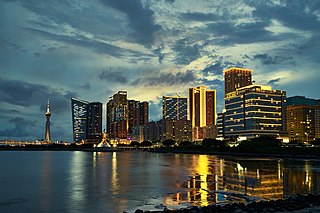
The economy of Macau is a highly developed market economy. Macau's economy has remained one of the most open in the world since its handover to China in 1999. Apparel exports and gambling-related tourism are mainstays of the economy. Since Macau has little arable land and few natural resources, it depends on mainland China for most of its food, fresh water, and energy imports. Japan and Hong Kong are the main suppliers of raw materials and capital goods. Although Macau was hit hard by the 1997–98 Asian financial crisis and the early 2000s recession, its economy grew approximately 13.1% annually on average between 2001 and 2006. Macau is a full Member of the World Trade Organization. Public security has greatly improved after handover to the People's Republic of China. With the tax revenue from the profitable gambling industry, the Macau government is able to introduce the social welfare program of 15 years of free education to all Macau citizens. In 2015, Macau's economy saw a sharp decrease due to the reduced spending by visitors from Mainland China since the Anti-corruption campaign under Xi Jinping.
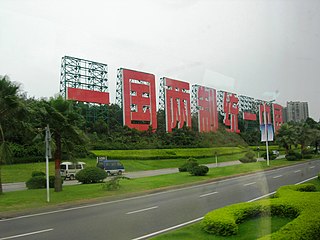
"One country, two systems" is a constitutional principle of the People's Republic of China (PRC) describing the governance of the special administrative regions of Hong Kong and Macau.
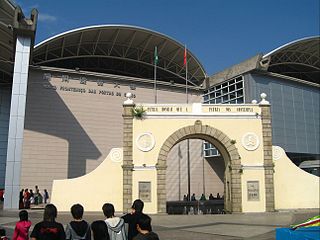
Nossa Senhora de Fátima is the northernmost and largest civil parish in the Macau Peninsula of Macau. It has an area of 3.2 square kilometers (1.2 sq mi) and a population of 126,000, which constitutes about 40.3% of the peninsula's land mass and one-third of the population.

Stanley Ho Hung-sun was a Hong Kong-Macau billionaire businessman. His original patrilineal surname was Bosman, which was later sinicized to 何 (Ho). He was the founder and chairman of SJM Holdings, which owns nineteen casinos in Macau including the Grand Lisboa.

The Macanese pataca or Macau pataca is the currency of the Macao Special Administrative Region of the People's Republic of China. It is subdivided into 100 avos, with 10 avos called ho (毫) in Cantonese.

Han Zheng is a Chinese politician serving as the current vice president of the People's Republic of China since 2023. He previously served as the first vice premier of the People's Republic of China between 2018 and 2023, and as a member of the Politburo Standing Committee of the Chinese Communist Party (CCP) between 2017 and 2022.
The United Bamboo Gang, also known as the Bamboo Union, is the largest of Taiwan's three main criminal Triads. They are reported to have roughly 20,000 members. The membership consists largely of waishengren and has had historic ties to the Kuomintang; they are said to be motivated as much by political ideology as by profit. They are known to simply call themselves "businessmen", but in reality, are also involved in organized killings and drug trafficking. The gang gained global notoriety when it became directly involved in politics in the early 1980s.

The Untold Story is a 1993 Hong Kong black comedy crime-thriller film directed by Herman Yau and starring Danny Lee and Anthony Wong, with the former also serving as the film's producer.

The Hello Kitty murder case took place in Hong Kong in the spring of 1999, when a nightclub hostess was abducted in Lai Yiu Estate, tortured and raped in an apartment in Tsim Sha Tsui, Kowloon, after stealing a wallet owned by one of her frequent customers.
The Sociedade de Turismo e Diversões de Macau, SA is a company in Macau owned by the family of Stanley Ho. Historically, it held a monopoly to Macau's gambling industry as the only licensee for casinos. In 2002, the government of Macau began issuing more licenses and the monopoly was broken. Still, of the 41 operating casinos in Macau, 22 are owned by STDM, as of 2019.

Forum Restaurant is a Cantonese restaurant officially established in 1977 at Sino Plaza, Causeway Bay, Hong Kong. Run by Hong Kong's international chef and ambassador of Chinese cuisine, Yeung Koon-yat (楊貫一), it is known for its expensive abalone dishes.
Ho Chio Meng was the first Prosecutor General of the Public Prosecutions Office of the Macau Special Administrative Region of the People's Republic of China, having been appointed in 1999, and re-appointed in 2004 and 2009; he served until 20 December 2014, when he was replaced by Ip Son Sang, a judge.
The 14K (十四K) is a triad group based in Hong Kong but active internationally. It is the second largest triad group in the world with around 20,000 members split into thirty subgroups. They are the main rival of the Sun Yee On, which is the largest triad.

The Legend and the Hero 2 is a Taiwanese television series adapted from the novel Fengshen Yanyi written by Xu Zhonglin and Lu Xixing. The series was first broadcast on TTV from September to October 2009, and was preceded by The Legend and the Hero in 2007.
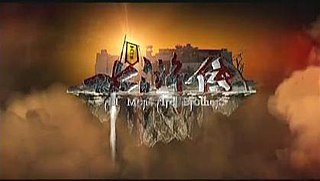
All Men Are Brothers is a 2011 Chinese television series adapted from Shi Nai'an's 14th century novel Water Margin, one of the Four Great Classical Novels of Chinese literature. The series is directed by Kuk Kwok-leung and features cast members from mainland China, Taiwan and Hong Kong. The series was first broadcast on 8TV in March 2011 in Malaysia.

The Central Leading Group on Hong Kong and Macau Affairs is an internal policy coordination group of the Central Committee of the Chinese Communist Party (CCP), reporting to the CCP Politburo, in charge of supervising and coordinating Beijing's policy towards the Special Administrative Regions of Hong Kong and Macau.
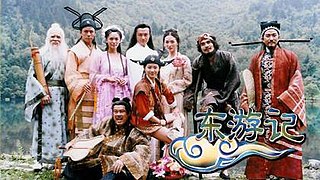
Legend of the Eight Immortals is a Singaporean television series based on stories about the Eight Immortals in Chinese mythology and adapted from the 16th-century Chinese novel Dong You Ji by Wu Yuantai (吴元泰). Produced by the Television Corporation of Singapore in collaboration with two mainland Chinese companies, the series had cast members from Singapore, Taiwan, Hong Kong and mainland China. It was first aired in Singapore on TCS Channel 8 from 26 November 1998 to 6 January 1999.

Wu Kong is a 2017 Chinese fantasy-action-adventure film directed by Derek Kwok and produced by Huang Jianxin, starring Eddie Peng in the title role alongside Ni Ni, Shawn Yue, Oho Ou and Zheng Shuang. It is based on a popular internet novel titled Wukong Biography written by Jin Hezai. The film was released in China on 13 July 2017.
Zheng Yumin is a former Chinese badminton player.















